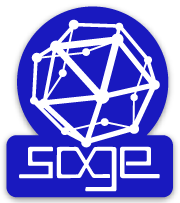Introduction to SageMath: a free mathematics software system
| Sponsors: |
|
| Time: | June 5, 2017, 11:00-12:00 |
| Location: | SFU's Big Data Hub (ASB 10900) |
| Attendance: | Participation in this event is free of charge, but please confirm your attendance |
| Topic: |
 SageMath
is free and open-source mathematical software. Its features cover many aspects
of mathematics, from basic arithmetic and calculus to advanced research mathematics
in algebra, combinatorics, numerical mathematics, analysis, and number theory.
SageMath
is free and open-source mathematical software. Its features cover many aspects
of mathematics, from basic arithmetic and calculus to advanced research mathematics
in algebra, combinatorics, numerical mathematics, analysis, and number theory.
Its open architecture gives it various distinct advantages over similar sofware, such as Maple, Mathematica, and Magma:
|
| Program: |
11:00 am Lecture: Julian Rüth 12:00 pm Lunch reception |
| Title: | Introduction to SageMath: a free mathematics software system. |
| Abstract: | The SageMath project started in 2004
to create a viable free open source
alternative to Magma, Maple, Mathematica and Matlab. Since then, a
community of hundreds of contributors has built Sage, a tool to perform
computations ranging from undergraduate calculus to all kinds of
research level mathematics.
This talk is an introduction to Sage. We will start by exploring its
Python-powered interface in a tour of its main features. We will then
use the CoCalc
to run Sage in a web browser; since no local
installation is required, this can be a great tool for research (or
homework) collaboration or just to jointly work on LaTeX documents.
After a quick discussion of ways to integrate Sage with other computer
algebra systems, we will finally look at some internals of Sage to see
how you could start contributing to Sage. |